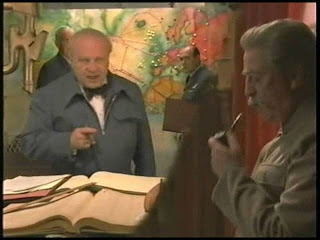 Josef Stalin (Iosif Vissarionovich Stalin, Russian: Иосиф Виссарионович Сталин; born Ioseb Besarionis dze Jughashvili, Georgian: იოსებ ბესარიონის ძე ჯუღაშვილი; born 18 December 1878 – 5 March 1953) was the General Secretary of the Communist Party of the Soviet Union's Central Committee from 1922 until his death in 1953. In the years following Lenin's death in 1924, he rose to become the authoritarian leader of the Soviet Union.
Josef Stalin (Iosif Vissarionovich Stalin, Russian: Иосиф Виссарионович Сталин; born Ioseb Besarionis dze Jughashvili, Georgian: იოსებ ბესარიონის ძე ჯუღაშვილი; born 18 December 1878 – 5 March 1953) was the General Secretary of the Communist Party of the Soviet Union's Central Committee from 1922 until his death in 1953. In the years following Lenin's death in 1924, he rose to become the authoritarian leader of the Soviet Union.Stalin launched a command economy, replacing the New Economic Policy of the 1920s with Five-Year Plans and launching a period of rapid industrialization and economic collectivization. The upheaval in the agricultural sector disrupted food production, resulting in widespread famine, such as the Soviet famine of 1932-1933, known in Ukraine as the Holodomor.
During the late 1930s, Stalin launched the Great Purge (also known as the "Great Terror"), a campaign to purge the Communist Party of people accused of corruption or treachery; he extended it to the military and other sectors of Soviet society. Targets were often executed, imprisoned in Gulag labor camps or exiled. In the years following, millions of ethnic minorities were also deported.
In 1939, the Soviet Union under Stalin signed a non-aggression pact with Nazi Germany, followed by a Soviet invasion of Poland, Finland, the Baltics, Bessarabia and northern Bukovina. After Germany violated the pact in 1941, the Soviet Union joined the Allies to play a vital role in the Axis defeat, at the cost of the largest death toll for any country in the war. Thereafter, contradicting statements at allied conferences, Stalin installed communist governments in most of Eastern Europe, forming the Eastern bloc, behind what was referred to as an "Iron Curtain" of Soviet rule. This launched the long period of antagonism known as the Cold War.
Stalin's careful control of the media helped him to foster a cult of personality. However, after his death his successor, Nikita Kruschev, denounced his legacy, initiating the period known as de-Stalinization.
Role during the Russian Revolution of 1917
Stalin in the Revolution and early wars and Russian Revolution (1917)
After returning from exile to Saint Petersburg, Stalin ousted Vyacheslav Molotov and Alexander Shlyapnikov as editors of Pravda, and took a position in favor of supporting Alexander Kerensky's provisional government. However, after Lenin prevailed at the April 1917 Party conference, Stalin and Pravda supported overthrowing the provisional government. At this conference, Stalin was elected to the Bolshevik Central Committee. After Lenin participated in an attempted revolution, Stalin helped Lenin evade capture and, to avoid a bloodbath, ordered the besieged Bolsheviks to surrender. He smuggled Lenin to Finland and assumed leadership of the Bolsheviks. After the jailed Bolsheviks were freed to help defend Saint Petersburg, in October of 1917, the Bolshevik Central Committee voted in favor of an insurrection. On November 7, from the Smolny Institute, Stalin, Lenin and the rest of the Central Committee coordinated the coup of the Kerensky government. Kerensky left the capital to rally the Imperial troops at the German front. By November 8, the Winter Palace had been stormed and Kerensky's Cabinet had been arrested.
Stalin played a decisive role in engineering the 1921 Red Army invasion of Georgia following which he adopted particularly hardline, centralist policies towards Soviet Georgia, which included the Georgian Affair of 1922 and other repression Lenin and Lev Kamenev helped to have Stalin appointed as General Secretary in 1922 to help build a base against Trotsky, who moved to formally impose the Party dictatorship over the industrial sectors.
Lenin, who disliked Stalin's policy towards Georgia, suffered a stroke in 1922, forcing him into semi-retirement in Gorki. Stalin visited him often, acting as his intermediary with the outside world. The pair quarreled and their relationship deteriorated. Lenin dictated increasingly disparaging notes on Stalin in what would become his testament. He criticized Stalin's rude manners, excessive power, ambition and politics, and suggested that Stalin should be removed from the position of General Secretary.During Lenin's semi-retirement, Stalin forged an alliance with Kamenev and Grigory Zinoviev against Trotsky. These allies prevented Lenin's Testament from being revealed to the Twelfth Party Congress in April 1923.
Lenin died of a heart attack on January 21, 1924. Thereafter, Stalin's disputes with Kamenev and Zinoviev intensified. Stalin allied himself now with Nikolai Bukharin. Stalin began advocating that the Bolsheviks should focus building communism in the countries they already controlled rather than spreading the revolution, as Trotsky, Kamenev and Zinoviev advocated. Trotsky, Kamenev and Zinoviev were ejected from the Central Committee and then expelled from the Party. Kamenev and Zinoviev were readmitted, but Trotsky was exiled from the Soviet Union.
Stalin pushed for more rapid industrialization and central control of the economy, contravening Lenin's New Economic Policy. At the end of 1927, a critical shortfall in grain supplies prompted Stalin to push for collectivisation of agriculture.After Bukharin criticized Stalin's plans for rapid industrialization as being financed by kulak wealth, he was ejected from the Politburo in November 1929. Stalin took great advantage of the ban on factionalism. By 1928 (the first year of the Five-Year Plans) Stalin was supreme among the leadership. and the following year Trotsky was exiled because of his opposition.








